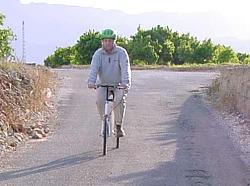Simple tool for checking rear axle alignment on a motorcycle, I was surprised to see how out of alignment a rear axle can be when going by the adjusting markings. see link below for more details.
Motorsports Forum - Axle Alignment.


Simple tool for checking rear axle alignment on a motorcycle, I was surprised to see how out of alignment a rear axle can be when going by the adjusting markings. see link below for more details.
Motorsports Forum - Axle Alignment.

kbalch (Jan 27, 2014), Toolmaker51 (Feb 26, 2017)
Thanks pursang! I've added your Motorcycle Axle Alignment Tool to our Motorcycle, Metalworking, and Measuring and Marking categories, as well as to your builder page: pursang's Homemade Tools. Your receipt:

pursang (Jan 27, 2014)
Full agreement here; on-highway or off-road. Having both wheels in alignment is only part of the handling package. When wheel alignment AND the frame register with each other is like getting an all-new bike. For me it was grating roadways on bridges, and the large reflective lane marking Botts Dots in our CA freeways, rain or shine.
Sincerely,
Toolmaker51
...we'll learn more by wandering than searching...
You are right about the extent of alignment errors that often occur by following axle marking, however many bikes have errors that your gauge will not detect.
There are two alignment issues, viz; alignment of the two wheels to each other and the chain alignment that you mentioned. Although in your case, you were lucky that the chain alignment was fixed by making the axle parallel to the swingarm pivot, that is far from guaranteed as a solution in general. Wheels are not always as centred in the swingarm as they should be.
To do a full alignment you have to start at the front. The centre plane of the front wheel needs to be inline with the steering axis, you can often check this by sighting through the steering stem, if the hole is too large for that you can turn up a couple of "sighting bushes" with small holes to slip into the stem. If the wheel is out (and I have found many to be) then you have to adjust the width of wheel spacers to get it right. Everything else follows from this.
Once the front is in position then you need to align the rear with the front and this may be done with just using the rear axle adjustments if you are lucky, but generally you need a combination of axle position adjustment and axle spacer width adjustment, this wheel alignment needs to be done keeping the two sprockets parallel to each other.
Once the two wheels are aligned only then should you look at chain alignment. If you have kept the sprockets parallel and they are still offset then if the rear sprocket is set wider then you have to machine the sprocket mounting down or sometimes, depending on design, you may be able to space out the front sprocket. If the rear sprocket is inboard of the front sprocket then you need to make a spacer for the rear one.
Once all that is correct the axle distances from the swingarm pivot may or may not be equal but you can't do much about that because it indicates that the basic frame and/or swingarm is out of wack due to manufacture or use.
People often refer to building an engine properly as "blue-printing" it. Chassis benefit from blue-printing also.
Tubular steel frames are often beyond what I term acceptable tolerances from new, but modern aluminium frames with welded in castings or CNC pieces which get finished machine after welding are pretty good from the factory but some bend a bit in even mild unintentioned excursions.
Toolmaker51 (Feb 26, 2017)
Mr. Foale's discussion of cycle frame alignment makes me want to jig mine up, examine, and correct my chassis. The simplistic plumb-line and string along tire sidewalls was effective but likely incomplete. This was first done after lacing aluminum Borranis in the standard cross four pattern to replace steel rims. The difference in handling was exceptional, not only by reduction in unsprung weight. XLCH then cornered like a Brit. Maybe not a Norton, but...
Sincerely,
Toolmaker51
...we'll learn more by wandering than searching...
It's Tony please, only the Tax Man calls me "Mr." and only school masters called me "Foale".
I have minimal experience with HDs but I have been told from many sources that some models deliberately have the rear wheels offset to compensate for a CG laterally offset from the bike's centre plane. A better solution would be to slightly offset the seat the other way. That could be done without being visually obvious.
Here are some pix. of an extreme case of offset wheels.


I built this coasting bicycle for some experiments with 2WS, I could change the steering ratio but also change between same sense and opposite sense steering. These pix show it with same sense steering with which I could happily ride it with the wheels almost, but not quite, laterally disposed. That bike was a hoot to ride, impossible without a huge smile on your face.

There are currently 1 users browsing this thread. (0 members and 1 guests)
Bookmarks